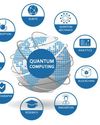
Did you know that 57.6 per cent of the world’s population uses social media today, with average daily usage being 2 hours and 27 minutes? There are 5.29 billion unique mobile users across the globe currently, which is equal to two-thirds of the world population. By 2025, the amount of data generated each day is expected to reach 463 exabytes globally.
The rise of internet usage leads to security concerns like cyber attacks and cyber threats. A cyber attack can use malware or ransomware to gain access to data, disrupt digital operations or misuse information. These threats are not only complex but are also difficult to detect. A cyber security practice is required to control these threats and attacks across the organisation.
Cyber security is a technology or process to protect networks, devices, information, programs and data from attacks, damages and unauthorised access. There are many ways to protect data and infrastructure, including intrusion detection, malware protection, and more.
Classification of cyber security
Cyber security encompasses all the measures taken to protect an entity from cyber threats and secure data. It can be broadly classified into the following distinct security areas:
Infrastructure security, covering DNS security, mail security, security information and event management
Application security, which focuses on preventing malware from infecting software and devices
System security addresses Windows/Linux server security, and vulnerability and patch management
Network security safeguards a computer network from intruders
Denne historien er fra March 2023-utgaven av Open Source For You.
Start din 7-dagers gratis prøveperiode på Magzter GOLD for å få tilgang til tusenvis av utvalgte premiumhistorier og 9000+ magasiner og aviser.
Allerede abonnent ? Logg på
Denne historien er fra March 2023-utgaven av Open Source For You.
Start din 7-dagers gratis prøveperiode på Magzter GOLD for å få tilgang til tusenvis av utvalgte premiumhistorier og 9000+ magasiner og aviser.
Allerede abonnent? Logg på

Linux Foundation launches LF India to foster open source innovation and support in India
The Linux Foundation, a nonprofit organisation dedicated to driving innovation through open source, has announced the launch of LF India.

Red Hat launches Ansible Automation Platform Service on AWS
Red Hat, Inc., has announced the general availability of the Red Hat Ansible Automation Platform Service on Amazon Web Services (AWS) as a managed offering available through AWS Marketplace.

Fedora Asahi Remix 41 is now generally available
The Fedora and Asahi Linux projects have announced the general availability of Fedora Asahi Remix 41, the latest version of this distribution tailored for Apple Silicon Macs.

SageMath: A Second Glance at Cybersecurity
The eighth article in the series on SageMath explores a classical encryption scheme called the Rail Fence cipher and introduces the concept of symmetric-key encryption.

Building Cross-Platform Mobile Apps with lonic
Mobile apps are an intrinsic part of daily life today we use them to order food, groceries, taxis, and more. As these apps need to work across platforms, developers are focusing on cross-platform app development so that they code only once to create apps that function on multiple platforms. lonic is a framework that can help developers build apps faster than with native app development, while saving them time and money. Let’s learn how to install and deploy it.

Open Source AI Frameworks: Integrating AI with lot
Open source Al helps loT devices learn, adapt, and automate actions based on real-time data, improving convenience and security. Here’s an overview of six key open source Al frameworks that help integrate Al with loT, and the challenges they face.

Open Source loT: A Primer for Everyone
Open source IoT platforms promise to play a central role in shaping the future, making it possible for more people and businesses to benefit from smarter, more efficient solutions. We look at a brief history of this tech and explore emerging trends.

Using Open Source and Blockchain to Build Decentralised loT Networks
Explore how blockchain is being integrated with loT to create decentralised networks. Find out how leading open source projects like IOTA and Streamr use blockchain to ensure data integrity, security, and privacy in loT ecosystems.

Internet of Things: Running Language Models on Edge Devices
Let’s delve into the technical aspects, challenges, and benefits of deploying language models on edge/loT devices.

How Open Source is Making Quantum Computing Accessible to Everyone
Open source initiatives are breaking down the barriers to quantum computing, making it accessible to everyone. Explore what quantum computing is, the challenges of traditional adoption, how open source platforms are democratising the technology, and how you can get started in this exciting domain.